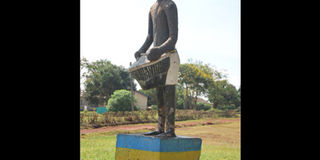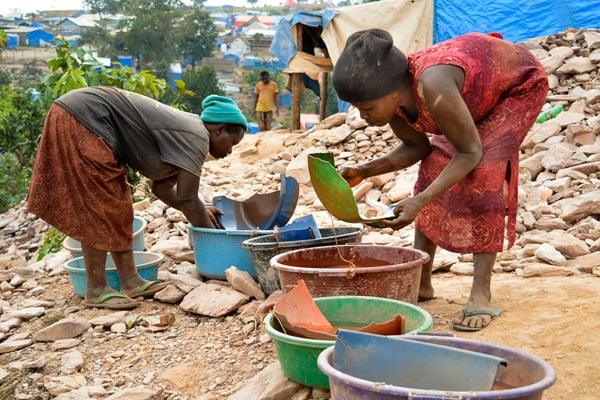Prime
Mwiri gears for another century

The Nabikamba statue is one of the monuments that tell the illustrious story of the school. Left, top, one of the older classroom blocks and below, walkers Dr Muduuli, MP Daudi Migereko, Dr Rugunda and school alumni during the Charity Walk PHOTO BY DALTON WANYERA
Today the road to Busoga College Mwiri gives its users as much trouble as it did to Rev. H.A Brewer, Mwiri’s headmaster in 1911, while he repeatedly visited the Mwiri Hill in search of a place to relocate the school 1932.
The institution was initially called Balangira High School meant to give education to sons of chiefs. Since establishment it had called Kamuli home. It is the long distances and heavy winds which brought down the dilapidated structures that necessitated its transfer but temporarily sought refuge at Kings College Budo.
The leafy greenery and the thick forest that surrounded the school is long gone paving way for agricultural activities on the hill, escalating soil erosion.
Regardless, the school still stands on the highest hill in Jinja. Proud and determined to stay on, a spirit that, while celebrating a hundred years of existence and excellence with a centennial walk on July 24, the Chief Walker, an old boy and Minister of Information, Communication and Technology (ICT), Ruhakana Rugunda said, “ this school has withstood heavy storms, climbed high hills, crossed deep rivers, and shall continue to do so.”
The headmaster, Mr John Mukubira says there is hope of recovery and they have set out on this long journey. Some work that is giving Mwiri a new look is the upgrading of the dusty tennis court into a tarmacked one. But a few metres away, the sorry picture re-emerges. Teachers’ houses are dilapidated, with broken, rotting doors and algae has slowly eaten away the asbestos roofs. The computer centre, with its Internet facilities ideally to give the institution a ‘dot com’ aura, has rotting roofing sheets that speak of how ancient the school has remained.
The huge file piles in the headmaster’s office could also depict how less advanced the school is at record keeping given that it has lived for the 100 years though the linearly arranged sports trophies bring to memory the school’s past glory.
Humble beginning
This Anglican Church-founded school had its first 12 headmasters also servings as reverends. With the expanded population, the Kamuli location was no longer viable since it was a small village.
“Gradually, Mwiri has, over the years, attracted students from every corner of Uganda. The school has greatly contributed to the building of the nation. With its motto of “For God and our Country,” Mwiri natured Uganda’s first Executive Prime Minister and President of Uganda, Dr Apollo Milton Obote between 1942 and 1948. In fact Uganda borrows its national motto of For God and My Country from the school.
Yet one thing is clear, Mwiri has descended into an academic oblivion. This year, the school sent only seven students to university on government-sponsorship out of the over 100 who sat.
Mwiri, among old boys and teachers, is referred to as The School. It got less than 66 first grades at O’level out of 145 students who sat national exams in 2010. Those who have known the school long enough describe this is a “far cry” from what Mwiri used to be and what it has done for Uganda.
Dr Daudi Muduuli, the chairman, Busoga College Mwiri Old Boys Association, says: “I am very proud of this school but also very disappointed about what it has become. It is struggling academically and the academic infrastructure is worn out.”
He says while at Mwiri between 1965 and 1971, the school was the best in Uganda. In 1971, over 65 students out of 70 who sat A’ level joined Makerere.
Mr Moses Mugulire, an OB of the school and the current examinations’ master, recalls, 80 out of 85 students who sat examinations when he was there joined university.
Between 1990 and 2000, the school’s performance was “excellent.” In 2000, 14 students out of 15 scored straight As in mathematics and 88.7 per cent passed at O ’level, according to officials.
“The cancer eating up this mighty school goes as far back as the turbulent Amin era,” Mr Muduuli says. “Even if the school continued to perform well, there was rot in academic infrastructure. Laboratories, libraries and dormitories were neglected. Teachers were paid peanuts and there was decline in discipline and no supervision.”
Lost glory
After this era and the following years, the once prestigious location of Mwiri, at hill top, worked against the teachers. The increasing cost of living dictated teachers had to seek sources of side income; operating small businesses or part time teaching. Good teachers left for towns.
The school’s fortunes continued to flag. By 2001, having admitted students with Aggregate 7 for Senior One, they lowered the cut-off points to Aggregate 12.
Between 2001 and 2004, the school took fewer than 10 students to university on government-sponsorship. The pass rate at O’Level declined from 88.7 per cent in 2000 to less than 60 per cent by 2003.
Mr John Mukubira, the then deputy head teacher and an old boy, who became headmaster in 2005, inherited a demoralised staff. However, he is optimistic the changes he has made will yield fruit.
“We have created more hours for lessons, bought more textbooks and discipline is improving,” he said. Performance improved a little from seven students who passed to university on government-sponsorship in 2005 to 19 in 2006, then 21 in 2007 though it fluctuated to 13 in 2008, eight in 2009 and seven in 2010.
Mr Mukubira explains that the fluctuations reflect the kind of students they admit. He says Mwiri is no longer attractive to brilliant students, so they admit students from poor rural schools who struggle to come out at the top.
The school cut-off point at O’ Level is Aggregate 8 at P.7. However, most times, they do not get this quality, so they relax it to 10.
The cut-off point at A’ level is 25 points in best eight subjects but they are also not attracting the best students, so they often take 27 to attract students. Comparatively, for a top school like Kings College Budo, the cut off points for boys is aggregate 10 in eight subjects.
Mr Mukubira says the administration has strengthened discipline among teachers and students. The teachers voluntarily spend more hours teaching and supervising preps.
OBs regularly visit the school to encourage and motivate students to work harder. Dr Muduuli also says the OBs have renovated the school, especially the dormitories. They have also promised to construct a multi-purpose centennial building to accommodate offices and labs. The school is among the 42 secondary schools to be rehabilitated with a loan from the African Development Bank.
“Most of government secondary schools are now in a sorry state like this one, but the government has already procured money and is focusing on bringing them back to their glory by renovating all of them,” Dr Rugunda told walkers during the ceremony.
“Mwiri has played a great role in educating young people over the last 100 years, people who have grown old and have played a critical role and made a great contribution in shaping the destiny of our country,” he said adding that the diaspora is in full solidarity with what they are doing.
Mr Mukubira says as the school celebrates its centenary, it need a lot of support from OBs. He says in 2005, the school needed Shs6b for renovation, which has now doubled.
The Assistant Commissioner for Secondary Education, Francis Agula, in a separate interview said; “Government stopped giving secondary schools capital development fund because they are only prioritising universal education.
“Our target is to increase access of children to universal education. We are only giving capital development fund to schools that are running universal education. If the traditional schools want the capitation grant, they should also join the universal secondary school programme,” Mr Agula said.
=================================================
Old Boy’s memories of a great school
It has been 12 years since I first drove through the blue and gold gates of Busoga College Mwiri enroute to the most vibrant eighteen month period of my secondary school career. Images from my first twenty-fours on The Hill, as old boys refer to it, are forever stored in my mind’s eye.
An older cousin with whom I had made the trip, pointed out my dormitory. I instinctively knew that the initials “HN” stood for Hannington, in memory of the late Bishop James Hannington. Walking into my Form Five dormitory, I was taken aback at the incredibly small size of it akin, as it were, to a large bedroom and not the warehouse-sized space I was accustomed to.
Imagine my shock as a Form Four boy, incidentally a childhood friend, walked through my Senior Five dorm, coming, as I did, from a Catholic school that frowned upon the social mixing of students from different classes.
But the shock was abated by the magnificent vista that opened at my feet the first time I stepped onto the terrace wall surrounding the school and beheld the incredible beauty of the Kakira sugar plantation all round the hill and Lake Victoria directly in front of us on the far side of the Jinja-Kampala highway.
Originally for the sons of kings and chiefs and now host to academically gifted boys from every strata of society, Busoga College had a history rich with myth, fact and folklore. There was the famed leopard, emblem of the school, which was said to live in the forest on the side of the hill and only ever appeared to Housemasters with a gift for embellishing the facts of life, or students whose sole goal in life seemed to be drinking every type of gin brewed by the Kakira cane cutters.
There was the school carpenter, Mzee Wambuzi, whose tenure at the school was said to have commenced long before the arrival of his namesake and now retired Chief Justice, Samuel Wako Wambuzi.
Mzee Wambuzi had spent so long wielding a hammer that his hands were then permanently bent into a hooked shape; shaking his hand was undertaken at one’s own peril.
There was the merit board in the old main hall, on which we all aspired to have our names engraved as Head of School, an honour reserved for the best and the brightest.
My fondest discoveries were both located in the dining hall. Never in my life have I encountered forks bent in such grotesque ways; the mind boggles as to the ways in which they were so fashioned. Another more pleasant surprise was the piano player who serenaded us at our first mealtime, and proceeded to do so every single mealtime for the rest of my time there. A student himself, he has now transformed himself into a recording pianist par excellence.
Mwiri would not be Mwiri without the cricket. All you required was a reasonably long, flat stretch, a bat and a ball or rock, and voila, a game was in progress. If you ever heard the yell, “ball!” Duck first and ask questions later. Such as I ask now, “Where has the time gone?”



